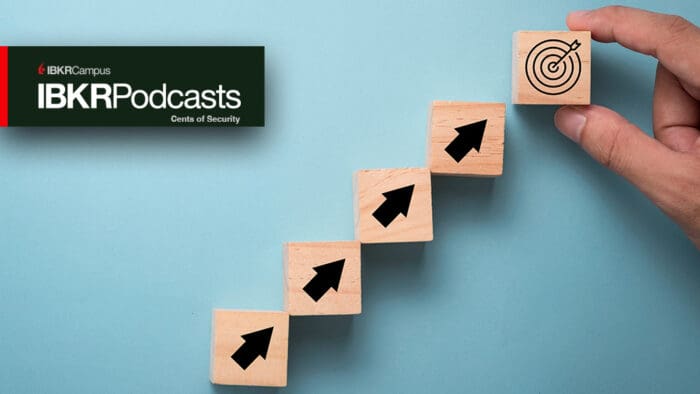Since both growth and value can be a positive for investor portfolios, which strategy is the right way to go? Are there more risks with one over the other? Stefano Grasso, Senior Portfolio Manager for Enhanced Value Fund joins Cassidy Clement, Senior Manager of SEO and Content to explore value vs growth investing.
Contact Information:
https://www.linkedin.com/in/stefanograsso/
Summary – Cents of Security Podcasts Ep. 30
The following is a summary of a live audio recording and may contain errors in spelling or grammar. Although IBKR has edited for clarity no material changes have been made.
Cassidy Clement
Welcome back to the Cents of Security podcast. I’m Cassidy Clement, Senior Manager of SEO and Content at Interactive Brokers. Today, I’m your host for our podcast and our guest is Stefano Grasso, the Senior Portfolio Manager for Enhanced Value Fund. Since both growth and value can be positive for investor portfolios, which strategy is the right way to go? And are there more risks with one or the other? All that and more is going to be discussed today as we explore value versus growth investing. Welcome to the program, Stefano.
Stefano Grasso
Hello. Hi, Cassidy. Thank you for having me.
Cassidy Clement
Of course. So you’ve been on some of our other IBKR podcasts, some of them talking about different investing sectors and opportunities and so on and so forth. What is your background in the industry for our listeners?
Stefano Grasso
I believe I’m kind of… I have a different background from many portfolio managers. I haven’t done this for the whole of my career. I started my career in consulting with McKinsey. With them I studied also. I earned my MBA at Columbia Business School in New York in 2009. I then moved to ENI oil and gas company. I was in their trading unit in London initially and then I moved to Singapore as Head of Trading Operation for the Asia Pacific region. So I come with this sort of consulting and trading background.
And I started then in 2020, I decided to join an asset managing company launch- Enhanced Value Fund which is the fund that I now manage. But specifically talking about investments, let’s say in parallel to these working experiences, I started managing my family portfolio in 2000, right after the .com crisis. I inherited the portfolio and I managed it via ETF. That was what I was doing before.
Going to the Business School at Columbia, I happened to meet with Warren Buffett and I was kind of enlightened by the value investing approach and philosophy. And since then I started moving the portfolio from just ETF to single stocks. Initially, the ones Berkshire Hathaway the company Warren Buffett was investing in and then venturing into what I thought was my kind of area of competence, circle of competence. And since those years, I’ve been investing in the stock market and then with my work in the commodity market and here we are.
Cassidy Clement
Well, that’s great. So I mean, seems like you have great exposure to the exact topic today from both business and personal investing. So to get right off, what really is the difference between value investing and growth investing?
Stefano Grasso
As I mentioned before, I discovered value investing at Columbia Business School. There is a program that I did that was called the value investing program. Actually I took the course with Professor Bruce Greenwald. And you know, everything dates back to Benjamin Graham. He was the teacher of Warren Buffett and his definition of investing and what then became value investing is deriving the intrinsic value of the common stock independent of its market price. So you know, currently we have technical analysis, the momentum traders and a lot of information for traders is driven by the actual price movement. So it’s a loop whereby the actual result- you’re trying to predict the actual results by studying the previous inputs in terms of stock price and funds flows and things like that.
Benjamin Graham was having a completely different approach. He was saying let’s look at the business without even looking at the stock price and then we come up with an idea of where the stock price should be. And only then we check actually where the stock price is. And that’s very powerful because it clears you from all the buyers of having price influence in your view and so forth. He also was a very keen, if you want, value investor extremist in a way that he came up with this Net-Net term concept, which is basically when a stock is priced below the balance sheet value.
So you take the whole assets of the balance sheet in the company, you discount the assets for what can go wrong, the replacement value of the assets, so the market value of those assets. Then you take out the liability and then what is left? You see, if the market price is even below what is left and he used to invest in dozens of these companies without studying them a lot. Just stopping there and that proved to be a very good strategy. He had a great return for his years. Nowadays the Net-Nets are less frequent in the market. There are a few. We have a couple in our portfolio. But of course, when you have a company that is a Net-Net, usually a company that has also some risks of insolvency problems. So it’s a different story.
Cassidy Clement
So could you give an example of maybe like the value investing versus an example of growth investing for the listeners?
Stefano Grasso
You know, value investing, to make an analogy, is when your favorite pair of socks go on sale at 50% the usual price, you know them, you like them. You’ve been buying them repetitively and then you know, they’re just cheaper. So that’s value investing in essence.
Growth investing, on the other hand, is when you venture and you go and try the new fancy fusion sushi restaurant in your neighborhood that just came up. I mean, you have great expectations, but you don’t know really what it is until you try it, right?
So coming to a more concrete example. A value investing type of stock is you can say Verizon or AT&T- the telecom companies. They are a very typical example of value plays. Their revenues are quite stable. They are priced at price earnings, price to book multiples that are reasonably low. They have high dividend yields. So it’s the typical value play if we have to come up with a concrete example.
On the other hand, if you want to look at growth investment example, you can think of a stock like Amazon. Amazon has always been trading at very high multiples in terms of price earnings. And the price to book even more. And they have always been or often been trading at levels that were discounting something in the future that was about to happen. So great, that was improving the evaluation. So I hope with these two kind of telecom, very boring business for value and Amazon more exciting business for growth, you get a sense of what is which.
Cassidy Clement
I guess like after hearing all that a lot of listeners would think, OK, that’s awesome. But is one better than the other? And I know that’s a question that comes up a lot. What’s the normal response for that one?
Stefano Grasso
You know, our fund is called Enhanced Value Fund. So you’re asking the barber if you need a haircut so I can give you that. But look. Studies say that quality and value outperform growth through the cycle, okay? But you know, to some extent, depending on how you do the analysis and how do you find qualities today? Or at the time of the investment and so forth. So I don’t feel like being so clear cut and black and white.
What I think is worth knowing and thinking about is that it is well known that the biggest enemy in investing is yourself, is your emotions, okay? So if you have this in mind, all the biggest mistakes were made by, you know, selling at the bottom or bought in the top of the market. So emotions play a big role and you don’t need really to be super smart to do quite well in the investment. But you need to be very Rational. Now the value portfolio tends to have a beta to the market that is lower than the growth one. So, to go back to the example that we had before. Amazon, during the .com bubble, I was starting investing at the time.
I remember that very vividly went down 93% from peak to the bottom, right? And we’re talking about one of the most successful companies in the world was successful before and was successful after that right. Would you have held? I’m not sure. I’m not sure I would have held to that dramatic destruction temporarily, but still. Mark to market destruction of wealth.
So value portfolio tend to have less volatility which helps not testing your limits in terms of what you can take in terms of drawdown. So especially for the not super aggressive and experienced investors, that’s another way to go for value versus growth.
Cassidy Clement
Right. So essentially like most other investments, you need to look at, you know, what’s your risk profile, how risk averse are you, what style is matching? Maybe your investment goals or other factors within the market because as you said there’s different times where different strategies have worked, and that doesn’t necessarily mean they’ll always work. So that leads me kind of into the next question, which is, is one more risky than the other? Is one riskier than the other?
Stefano Grasso
Yeah, I mean, look, when anyone, whichever strategy you have, if you are a portfolio manager or if you are even an investor, what you care about in the end is the return you have on the money that you’re investing and managing, right? So you don’t care if it is a value defined stock, or if it is a growth stock, what you want is at the end of your horizon. As you said, your time investment period to have the best, the best return. And as you said, you also need to look at the downside of your investments. So we discussed before value is less volatile, the beta is lower so you have less swings. But in terms of opportunity cost, after ten years having been invested in some value assets, are you better off than growth? And then come down to the risks of the two portfolios. The value portfolio typically has the risk of being the so-called value trap, okay?
So if we take the example of Verizon and AT&T, they’re going to have declining revenues of, you know, single digit for the next twenty years. They are going to have the dividend being cut, the cash flow slowing down and then in twenty years’ time, they might have been doing a bit of buybacks. But eventually you will be with the below market return. So that’s I think the biggest risk when you look at value, you see things that are very cheap. But they are cheap for a reason, and they can get cheaper as time passes. So that’s the number one issue that we have.
While for growth, the problem is the opposite, in a way. When you buy a growth company with a relatively high multiple, you are, like it or not, having an expectation that the future development of the company is going to be rosier and they’re going to increase. So, you know, the example of Amazon. I think it’s interesting because in 2006, Amazon was trading at very high multiples, even higher than today.
Their core business, that was the e-commerce was losing money and was forecasted to lose money for forever at the time. And they come up. So the investor at the time, I don’t know what they were thinking. But what happened in 2006 is that they came up. They launched Amazon Web Services. They currently make the bulk of their cash flow and profitability. So I generally believe that in 2006, no one knew what was Amazon Web Services in the investor base of Amazon.
Maybe Jeff Bezos was really betting on that, but very few other people knew that. If that were not to happen as successfully, if the competition from Google and Azure or Microsoft was harsher and quicker to catch up, we would be in a very different place today, right? So it’s a great company. We love Amazon, but in 2006 you couldn’t really put on a piece of paper like the prediction of what happened with Amazon Web Services. So, you have to appreciate the really unpredictable.
Cassidy Clement
Yeah, absolutely. I mean, thinking about it, like you said from the growth perspective of, you’re starting out as this company that goes to the moon and then drops back down to earth. Unless you really understand the landscape of the market or the potential for the market at the time, which was kind of uncertain because for.com a lot of things kind of felt like a fad or trend. Who would have known?
Stefano Grasso
Yeah, and you have also, when you play that game, the air is very thin. And you buy Amazon as 70x earning and can go to 100x earnings. And the question is.. I’ve been in that situation multiple times. When do you sell? Do you sell at all? There are the Amazon evangelists that say I hold Amazon forever and never going to sell shares because of the great history that they have. But we know past history is not a certainty of future performance. So, the question is do you sell at 100x earning? Currently NVIDIA is trading at very high multiples. I can’t believe that the rest of the semiconductor world is going to look at those fat margins and not put a lot of CapEx into trying to erode the dose and gain share into that.
So you know the question is when do you? It’s much more difficult and arbitrary to say, when do you sell? When do you get out? When do you double down? Because of course you will never get to a single digit price earning multiples for Amazon, at least in the foreseeable future. So it’s much more discretionary. And that’s precisely why interest rates go up 1%. And then Amazon can swing, you know, 30%, and you don’t have the same for Verizon because it’s much less than the consensus. The fork, the the min and max analyst consensus is much more compressed.
Cassidy Clement
Right. I mean that actually takes me into my next question, which is, like you’re mentioning all of these different market factors and different multiples that may go into evaluations know is a little more is a little complex for essentially this topic.
But what should investors keep in mind when selecting one of these strategies? Because it is information overload. If you do start to do the research, especially on some of these companies that have been around for a while or companies that are incredibly trendy or maybe trending for the past several years so you’ve got years of data to go off of, what really should investors be keeping in mind when selecting one?
Stefano Grasso
I think the most important thing is make sure you make your own plan and your own strategy, and make sure you own it. Because as we discussed before, the biggest enemy in investing is yourself. If you do something because you’re copying someone else, when the market crashes you’re confident. My fate. You know, historically we have been, I mean 97% or 93% for Amazon was an extreme. But you know we’ve been through drawdowns of 50% or more for S&P 500 multiple times in in history. Even for stocks like Berkshire Hathaway, which is typically considered a safe stock, it’s happened more than five times that they went down more than 50% peak to bottom. So if you don’t have thought through your strategy, which plan you want to have, if you don’t have digested it, you’re more likely to deviate from it, which is exactly what you shouldn’t be doing so. So it’s better if your plan is sound. You sort of digested it. When the times are calm, they’re more likely to stick to it and have a successful experience when markets are rough, basically.
Cassidy Clement
So you also mentioned- earlier in the conversation, you were talking about learning about value investing versus growth. I think you had mentioned when you were in school at Columbia, what are some ways that listeners can maybe get exposed to some examples of this?
I mean, we have IBKR Campus which you can go to at anytime. It’s free. But are there other things out there? Maybe like books or films or anything like that, that are like a quick reference of, oh yeah, that was a value investment approach, that was a growth investment approach.
Stefano Grasso
There are of course countless resources. I like to, and actually we did a podcast with you guys on these letters, are Warren Buffett’s annual letters. There are like, I think more than about fifty of them available on the website each year.
And it’s very interesting to read these letters with the benefit of insight and read these letters in the years where the markets were really dramatically turbulent. So I think that’s a real case example where soctheory meets practice. And you see Warren Buffett’s view of the world when the uncertainty is out there. That’s very powerful for me. A book that many value investors recommend is “The Intelligent Investor” and the book speaks about the market at large and how the irrationality can play at your advantage if you are calm and savvy and you don’t get dragged into the craziness of certain periods. So these two resources I think for starters is where I would definitely recommend to start.
Cassidy Clement
Great. Well, you brought up some really good resources and some really great answers today. Stefano, thanks for joining us.
Stefano Grasso
Thank you. Thank you for having me, have a great day!
Cassidy Clement
Sure. So as always, listeners can learn more about an array of financial topics for free at www.interactivebrokers.com. Follow us on your favorite podcast network and feel free to leave us a rating or review. Thanks for listening!
Disclosure: Interactive Brokers
The analysis in this material is provided for information only and is not and should not be construed as an offer to sell or the solicitation of an offer to buy any security. To the extent that this material discusses general market activity, industry or sector trends or other broad-based economic or political conditions, it should not be construed as research or investment advice. To the extent that it includes references to specific securities, commodities, currencies, or other instruments, those references do not constitute a recommendation by IBKR to buy, sell or hold such investments. This material does not and is not intended to take into account the particular financial conditions, investment objectives or requirements of individual customers. Before acting on this material, you should consider whether it is suitable for your particular circumstances and, as necessary, seek professional advice.
The views and opinions expressed herein are those of the author and do not necessarily reflect the views of Interactive Brokers, its affiliates, or its employees.
















Join The Conversation
For specific platform feedback and suggestions, please submit it directly to our team using these instructions.
If you have an account-specific question or concern, please reach out to Client Services.
We encourage you to look through our FAQs before posting. Your question may already be covered!